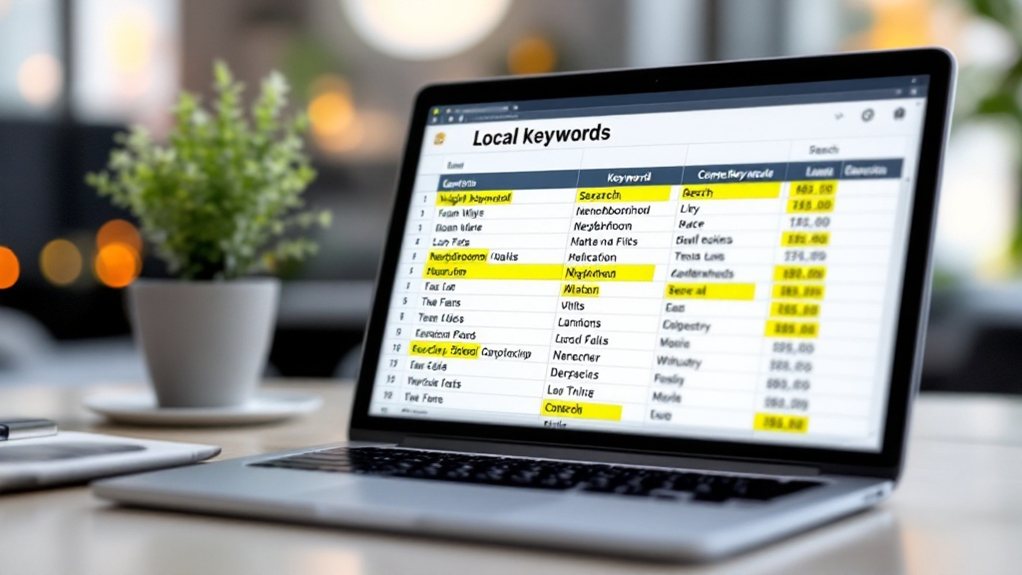To write sales copy that incorporates local keywords, you'll want to start by identifying relevant terms used by customers in your geographic area. Structure these keywords naturally within your copy, balancing specificity with broader terms. Optimize your meta descriptions and headers too. Leveraging local SEO best practices can boost your online visibility and attract more customers searching for your products or services nearby. Let's dive deeper into the process.
Identifying Relevant Local Keywords

When identifying relevant local keywords, the purpose is clear – to pinpoint searches related to your business that target specific geographic regions. This helps increase your online visibility among local customers and improve your search engine rankings. Keyword prevalence is a major ranking factor. Tools like Google Keyword Planner, Semrush's Keyword Magic Tool, and Ahrefs can assist you in this process. Begin by brainstorming seed keywords, then find more specific long-tail options. Filter by local intent and prioritize keywords with good search volume and lower competition. Integrating these local keywords into your content optimization and competitor analysis will further strengthen your SEO strategies. Understanding your local audience is key – choose keywords that address their needs and buying intent.
Structuring Local Keywords in Sales Copy

Structuring local keywords in your sales copy is crucial for capturing the attention of your target audience and improving your search engine visibility. Incorporate your main business keywords along with location-specific terms to attract local traffic. Maintain keyword order flexibility, but keep it consistent for optimization. Use longer, more specific keywords to match precise user intent, and balance them with broader terms to reach a wider audience. Leverage modifiers like "affordable" or "emergency" to refine your keywords, and include natural local phrases like "near me" to align with how customers search. Thoughtfully weave these local keywords into your content to enhance relevance and drive conversions. Analyzing the search intent of your target audience can help you identify the most effective local keywords to incorporate.
The Significance of Local SEO in Copywriting

Crafting sales copy with local SEO in mind can significantly boost your audience engagement and search visibility. By incorporating relevant local keywords, you can ensure your content resonates with your target customers and appears prominently in local search results. Locally-targeted keywords help the business rank better in search engine results. This strategic approach can drive more qualified traffic to your business, ultimately leading to increased conversions. Creating content related to news and events happening in the local area can boost relevance and signal to search engines that the business is a local authority.
Targeted Audience Engagement
The significance of local SEO in copywriting cannot be overstated, as it allows you to tailor your content to the unique needs and interests of a targeted regional audience. Local keywords help you create more relevant and engaging copy that resonates with your local customers. By engaging with local events and online discussions, you can enhance community interaction and increase your business's appeal. Optimizing your copy with local keywords helps boost visibility in local search results. Optimizing your sales copy with location-specific keywords ensures your messaging aligns with local interests, encouraging greater audience involvement. Customer reviews are also crucial in building trust, and integrating them into your copy can significantly boost your credibility and engagement.
Improved Search Visibility
While local SEO may seem like a lofty goal, the significance of its impact on your sales copy's visibility cannot be overstated. 97% of consumers research local businesses online, and claiming and optimizing your Google Business Profile is crucial for boosting your online presence. Incorporating location-specific keywords can also drive sales, with 28% of local searches resulting in a purchase. Moreover, a staggering 80% of local SEO campaigns achieve a 500% or better ROI, showcasing the long-term benefits. Local organic search provides the best marketing ROI for 49% of businesses, highlighting the value of investing in local SEO. By adopting these strategies, you can stand out from competitors, enhance your online reputation, and ultimately drive more traffic, conversions, and business growth.
Copywriting Techniques for Successful Local SEO
How can you leverage copywriting techniques to optimize your local SEO efforts? By incorporating local keywords, crafting engaging content, and leveraging user reviews, you can boost your visibility and credibility with local customers.
Use local keywords strategically in your sales copy to help your business appear in location-specific searches, driving more relevant traffic to your site. Optimizing for local keywords is crucial for improving your local search rankings.
Create high-quality, compelling content that addresses local needs and events, keeping visitors engaged and signaling to search engines the value of your offerings. Highlight local events, community involvement, or region-specific expertise to demonstrate your relevance to the local market.
Showcase positive reviews from satisfied local customers to increase trust and improve your search rankings, highlighting your strong local reputation. Encourage customers to leave reviews on major platforms like Google, Yelp, and Facebook to build a robust online presence.
Leveraging Keyword Research Tools for Local SEO
Google's Keyword Planner is a great free tool to start your local keyword research. Use it to find search volume and competition data for terms relevant to your business and location. You can also leverage competitor analysis tools like Semrush's Keyword Gap to uncover keywords your rivals are ranking for. Local keyword research revolves around identifying the core term, the keyword modifier, and the location. This information can help you create a more diverse and targeted keyword strategy for your local SEO efforts.
Leveraging Keyword Planner
To make the most of local SEO, you'll want to tap into the wealth of data available through Google's Keyword Planner. This powerful tool can help you:
- Identify location-specific keywords that align with your business and target audience.
- Analyze search volume and competition for local keywords to prioritize your efforts.
- Discover emerging search trends and patterns to inform your content strategy.
- Understand the psyche of your target customers through the insights provided by keyword research.
Competitor Keyword Analysis
Building on the insights from leveraging Google's Keyword Planner, you'll now want to analyze your competitors' keyword strategies to uncover opportunities for your local SEO efforts. Use tools like Ahrefs and SEMrush to identify the keywords your competitors are targeting, their search rankings, and the content they're creating. Pay close attention to long-tail phrases and service-specific terms that could be less competitive but still valuable. Additionally, look for content gaps where you can provide more comprehensive information than your rivals. Monitoring competitors regularly is key to staying ahead of shifting search trends and tactics. By understanding your competitors' keyword strategies, you can create a targeted, high-performing local SEO content plan.
Integrating Local Keywords Into Content
When incorporating local keywords into your content, it's crucial to ensure they are strategically placed and integrated seamlessly. This starts with using H1 tags for your primary local keywords to signal content relevance to search engines. Follow up with keyword variations in H2 and H3 tags to enhance readability and support natural flow.
- Highlight local landmarks, neighborhoods, or street names in your headers to emphasize geographical significance.
- Align header tags with your local SEO keyword analysis to boost local engagement.
- Balance keyword integration with natural writing to maintain clarity and avoid repetition.
Analyzing local keyword search volume is critical for crafting effective localized content to ensure you're targeting the most valuable terms for your audience.
Optimizing Meta Descriptions With Local Keywords
Although meta descriptions may not directly impact search engine rankings, optimizing them with local keywords can significantly improve your website's visibility in location-specific searches. Start by conducting keyword research to identify relevant local terms using tools like Google Keyword Planner or Ahrefs. Then, incorporate these keywords naturally into your meta descriptions, ensuring they align with user intent and avoid keyword stuffing. Remember to craft unique, compelling meta descriptions for each page to enhance click-through rates.
| Local SEO Optimization Techniques |
|---|
| Use location-specific keywords in meta titles and descriptions |
| Leverage geo-modifiers like city names to target local searches |
| Ensure consistent NAP (Name, Address, Phone) across online listings |
| Regularly review and update meta descriptions based on performance |
| Utilize tools like Yoast SEO to optimize meta tags within character limits |
Enhancing Mobile-Friendly User Experience
Optimizing your website for mobile devices is crucial in today's digital landscape. By adhering to efficient mobile design principles, you can captivate your local audience and drive conversions. Ensure your content is responsive, with a consistent visual hierarchy and touch-friendly elements. Additionally, prioritize key information, leverage mobile-specific features, and optimize for performance and speed. This will create a seamless user experience that keeps your customers engaged.
- Incorporate mobile gestures, such as swiping and tapping, for intuitive interactions.
- Optimize button sizes and provide visual feedback to enhance user confidence.
- Leverage AI-driven support and secure data handling to build trust.
Targeting Long-Tail Local Keywords
To write sales copy that resonates with local customers, you'll want to discover niche-specific modifiers and structure geo-targeted keywords. Leveraging long-tail local keywords can help you hone in on your target audience's precise pain points and buying intent. By incorporating these hyper-specific phrases, you can create content that stands out and drives better conversions.
Discover Niche-Specific Modifiers
Uncovering niche-specific modifiers is a strategic way to target long-tail local keywords and gain a competitive edge. These modifiers add depth and nuance to your keyword targeting, helping you reach more relevant audiences. Consider incorporating:
- Quality modifiers: Words like "top-rated" or "highly-reviewed" establish credibility and trust.
- Occasion modifiers: Phrases such as "wedding" or "holiday" attract seasonal or event-specific searchers.
- Service modifiers: Include terms like "catering" or "installation" to highlight your offerings.
Structure Geo-Targeted Keywords
Structuring geo-targeted keywords is key to effectively reaching local audiences. Start by incorporating city, state, and neighborhood names into your keywords to focus on specific geographic areas. Don't forget to use "near me" queries to capture users searching for local services. Leverage competitor research and customer conversations to uncover regional terminology and preferred search phrases. Optimize your content by strategically placing location-based keywords in headers, meta descriptions, and throughout your copy. Create dedicated landing pages for each location you serve, and use unique content, local landmarks, and store details to boost relevance. Regularly track keyword performance, monitor local search results, and gather customer feedback to refine your geo-targeting strategy.
Monitoring Relevant Local SEO Metrics
How do you effectively monitor the relevant local SEO metrics that can make or break your sales copy optimization efforts? By tracking key performance indicators like website traffic, conversion rates, and local search traffic, you can gain a deep understanding of your audience's engagement. Additionally, analyzing your:
- Local search rankings and share of local voice
- Google Business Profile insights and customer reviews
- Competitor analysis and trend reports
will provide valuable insights to refine your local sales copy and drive better results. Stay on top of these crucial metrics to ensure your local SEO strategy is delivering the desired impact.
